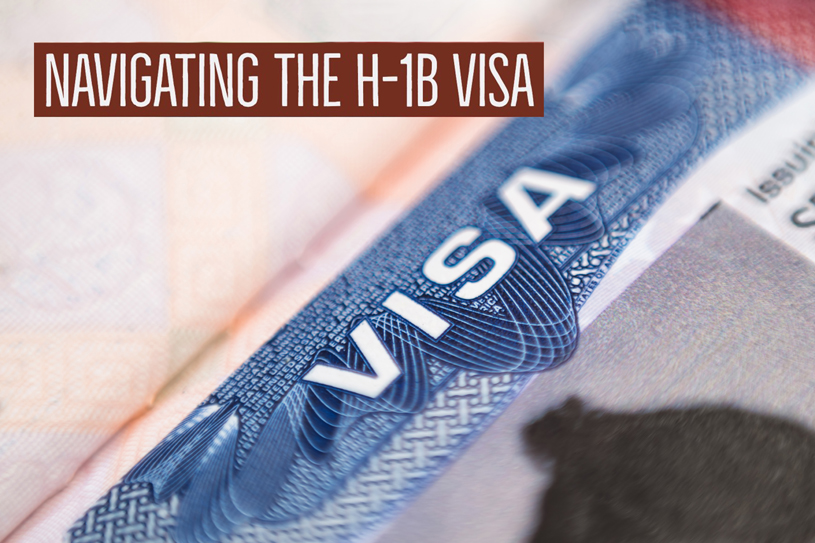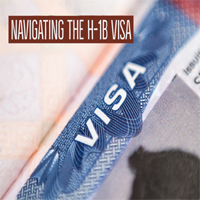Navigating the H-1B Lottery: An Interesting Gateway for Graduates and OPT Seekers.

You may have heard the term “H-1B visa” or “H-1B”. The H-1B program aims to address the shortage of specialized skills within the domestic workforce. It is specifically designed for employers looking for individuals with expertise in fields that require high levels of specialized knowledge, usually requiring at least a bachelor’s degree or equivalent qualifications. The intention is to provide a way for employers to temporarily employ highly qualified individuals who might not otherwise be authorized to work within the United States.
The H-1B visa is a critical step for those wishing to work in the United States under a specialized occupation. The lottery system is applicable to employers seeking to hire non-immigrant aliens with expertise in specialized fields or professions, including those requiring exceptional merit and abilities in technology, healthcare, engineering, and more. It serves as a vital pathway for international talent seeking job opportunities in the U.S.
Why is there an H-1B visa lottery to begin with? The U.S. often has a shortage of skilled workers especially in the STEM fields of Science, Technology, Engineering, and Mathematics. Unfortunately, the U.S. only designates a total of 85,000 H-1B cap visas each year and 20,000 are reserved for those with Advanced U.S. Degrees. Each year hundreds of thousands of potential H-1B workers will have their names placed into this lottery. The random H-1B lottery is considered the most efficient and equitable method to select who is eligible to petition for their visa as opposed to a 1st come 1st served method which would create absolute chaos.
For college students who will soon graduate or those approaching the end of their Optional Practical Training (OPT) period, the H-1B lottery holds great significance. As OPT, a temporary employment authorization for international students, approaches its expiration, individuals often seek H-1B sponsorship to transition from student status to professional employment within the U.S. The H-1B visa offers an invaluable pathway for these individuals to continue their careers in the country, securing opportunities aligned with their specialized skills and academic qualifications.
Obtaining an H-1B visa involves a meticulous registration process. Employers must register their potential H-1B candidates each year during the designated registration period (March). Subsequently, a randomized lottery selects the petitions to be processed, given the annual cap on available visas. This process underscores the importance of timely and strategic planning, especially for students poised to finish their academic programs or OPT, aiming to secure a position in a specialty occupation.
Given the competitive nature of the H-1B lottery and the annual limitations on available visas, proactive engagement with potential sponsors becomes imperative for graduating students or those concluding their OPT tenure. Establishing connections with employers willing to sponsor H-1B visas is pivotal to navigating this process successfully. If you cannot find a work sponsor or you are ultimately unsuccessful in the March lottery, there may be other options. An experienced immigration attorney can help you plan for your future from the employee side or the employer side.
To sum it up, the H-1B lottery is an essential gateway for individuals aspiring to contribute their specialized skills to the U.S. workforce. For students nearing graduation or the end of their OPT period, understanding the significance of seeking H-1B sponsorship and engaging with potential employers becomes crucial to realizing their professional ambitions in the United States. Start looking for jobs and potential sponsorships early. Inquire about H-1B sponsorship. Good luck!
This article does not constitute a solicitation or provision of legal advice and does not establish an attorney-client relationship. The answers provided should not be used as a substitute for obtaining legal advice from an attorney licensed or authorized to practice in your jurisdiction. You should always consult a suitably qualified attorney regarding any specific legal problem or matter on time.
About Author
 U.S. Immigration Attorney Seth Finberg is a 2005 graduate of the University of Georgia School of Law. Seth is a member of the Georgia Bar, the American Immigration Lawyers Association (AILA), and serves on the Business and Investment Committee for the South Florida chapter of AILA. Mr. Finberg is the owner and founder of South Florida based Finberg Firm PLLC and he represents clients nationwide and internationally in business, employment, and investment immigration. He can be reached by phone at (305)-707-8787 or by email at seth@finbergfirm.com or www.finbergfirm.com.
U.S. Immigration Attorney Seth Finberg is a 2005 graduate of the University of Georgia School of Law. Seth is a member of the Georgia Bar, the American Immigration Lawyers Association (AILA), and serves on the Business and Investment Committee for the South Florida chapter of AILA. Mr. Finberg is the owner and founder of South Florida based Finberg Firm PLLC and he represents clients nationwide and internationally in business, employment, and investment immigration. He can be reached by phone at (305)-707-8787 or by email at seth@finbergfirm.com or www.finbergfirm.com.
























